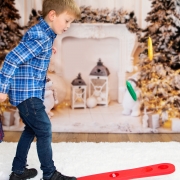Children with Dyspraxia: How Play-Based Learning Boosts Confidence and Skills
As we recognise Dyspraxia Awareness Week from the 7th to the 13th of October, it’s a vital time to reflect on the significance of play for children with dyspraxia. Dyspraxia is a neurological condition that affects coordination and motor skills, making everyday tasks more challenging for children who live with it. However, through thoughtful, play-based learning, parents and caregivers can offer children with dyspraxia a fun, supportive environment. Where they can build critical skills while boosting their confidence.
At Edx Education, we believe that play is one of the most powerful tools for learning, especially for children facing challenges like dyspraxia. Our range of educational toys, downloadable resources, and podcast, Play, Learn & Create with Edx Education. All advocate for learning through play. For all children, this playful approach can be especially beneficial in developing motor skills, problem-solving, and social interaction, which are areas often impacted by dyspraxia.
What is Dyspraxia?
Dyspraxia, also known as Developmental Coordination Disorder (DCD), affects a child’s ability to plan and execute coordinated movements. This can influence everything from walking and running to writing and grasping small objects. Children with dyspraxia may struggle with fine motor skills like using cutlery or holding a pencil, as well as gross motor skills such as balance and posture.
For these children, everyday activities that involve coordination can be tiring and frustrating. However, by using toys and games that engage them in purposeful play, we can help children practice and improve these skills while they have fun.
The Role of Play-Based Learning in Dyspraxia
Play-based learning allows children to explore, experiment, and learn at their own pace. It’s particularly effective for children with dyspraxia because it removes the pressure of structured learning environments and gives them the freedom to develop essential skills naturally.
At Edx Education, we provide a variety of toys and resources that encourage play-based learning. These toys can support children with dyspraxia by improving their coordination, problem-solving, and cognitive development in a fun and engaging way. Here’s a closer look at how some of our products can help:
Sand and Water Play for Sensory Exploration
Children with dyspraxia often benefit from sensory play, which helps them become more aware of their bodies and their environment. Sand and water play offers a tactile experience that encourages children to engage with different textures and materials. Scooping sand, pouring water, and building shapes are fun ways for children to develop hand-eye coordination, fine motor skills, and spatial awareness.
For children with dyspraxia, sensory play can also have a calming effect, helping them focus and enjoy their playtime without feeling overwhelmed.
Joey Jump for Gross Motor Skills
The Joey Jump is a fun and interactive toy that promotes gross motor skill development. Dyspraxia can make activities like jumping, running, and balancing difficult, but with the Joey Jump, children can practice these skills in a playful, low-pressure environment. By placing bean bags on the Joey Jump and then launching them into the air by stomping on one side of the board, children can improve their coordination, balance, and strength while enjoying the game.
This kind of active play is essential for children with dyspraxia, helping them build muscle memory and confidence in their movements.
Maths Cubes for Fine Motor Skills and Problem-Solving
Fine motor skills are often a challenge for children with dyspraxia, but toys like Maths Cubes can help improve these skills in a playful and engaging way. By connecting and manipulating the cubes, children practice the pincer grip and finger dexterity, which are crucial for tasks like writing and using tools.
In addition to improving motor skills, maths cubes also encourage problem-solving and cognitive development. Children can create patterns, solve puzzles, and explore early maths concepts like counting and sequencing, all while improving their fine motor coordination.
Supporting Caregivers with Play, Learn & Create Podcast
To further support parents and caregivers, Edx Education offers the new series 3 Play, Learn & Create with Edx Education podcast. This podcast explores various topics related to early childhood learning, including strategies for supporting children with dyspraxia. It’s a valuable resource for caregivers looking for practical advice on how to use play-based learning to help children build resilience, confidence, and essential skills.
Play as a Pathway to Confidence
Play isn’t just about fun—it’s a powerful way for children with dyspraxia to build confidence and resilience. By engaging in play-based learning, children can overcome challenges in a supportive environment, learning at their own pace while developing important skills. Whether it’s through sensory play, gross motor games, or fine motor activities, the right toys can make all the difference in helping a child with dyspraxia thrive.
At Edx Education, we are committed to providing resources that empower every child to learn and grow through play.
This Dyspraxia Awareness Week, let’s celebrate the power of play and how it can make a meaningful impact in the lives of children with dyspraxia. Explore our range of toys and resources today and discover how play-based learning can help your child succeed.



